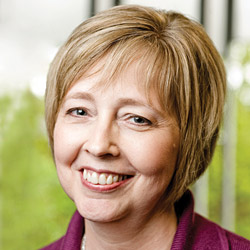From the Senior Editor
Science and a God of Grandeur

Remember when the plants and bugs in your backyard were a source of endless fascination? When you pondered the workings of your household light sockets? When you finally detected the Big Dipper in the night sky, or conducted your first "experiment" in the kitchen with mom? I do.
Every child revels in discovering something about how the world works, says Seattle Pacific University Professor of Physics Stamatis Vokos. So why do so many of us as adults seem to disconnect from scientific thinking?
The answer, says Vokos, is that most grownups have "an impoverished vision of science that comes about from an impoverished science education. Science is not an inert set of facts and formulas, but an empowering way of using our innate, God-given gift of 'hypothetico-deductive' reasoning to figure things out."
Vokos leads the SPU Energy Project, a research effort funded by the National Science Foundation to help teachers build on the "powerful but messy" ideas about the natural world that young learners bring to the classroom. The SPU team is working to ensure that more children grow up to understand and appreciate science.
A view of science as a celebration of God's creation and the gift of reason — and as a way to make the world a better place — characterizes the work of not just Vokos, but all SPU scientists.
One study by Professor of Biology Tim Nelson, Associate Professor of Biology Rick Ridgway, and students involves localizing a molecule in seaweed that is toxic to plants and animals and has the potential to affect global climate. Associate Professor of Biology Eric Long and a team of students study the ecology and behavior of blacktailed deer on Blakely Island. Assistant Professor of Biology Ryan Ferrer and his students are looking at how paralytic shellfish toxins affect sea stars, also known as starfish, which play a critical role in maintaining tidepool biodiversity.
And through the Genome Education National Initiative, Associate Professor of Biology Derek Wood and Associate Professor of Biochemistry Ben McFarland help take this commitment to real-world research to high schools, community colleges, and four-year colleges nationwide via a virtual collaboration computer interface.
I'll admit I was one of those children whose scientific curiosity lost its luster with age. But I've been fortunate enough to recapture my interest, in part because I work in an environment that values scientific discovery. This fall, for instance, I had the pleasure of hearing astronomer Jennifer Wiseman speak on campus about her work as senior project scientist for NASA's Hubble Space Telescope. An interview with Wiseman and photos from the Hubble appear in this issue of Response.
"When I look at things like the geologic time span for mountains and canyons to form across the globe, for continents to move, even for planets and new stars to form, I see the kind of drama that's taking place under the natural laws that God has ordained," Wiseman tells Response.
Her stories of the cosmos evoked the fascination I felt looking at the skies as a child — and a new awe for "a God of grandeur and patience and unfathomable time and space."
Jennifer Johnson Gilnett
